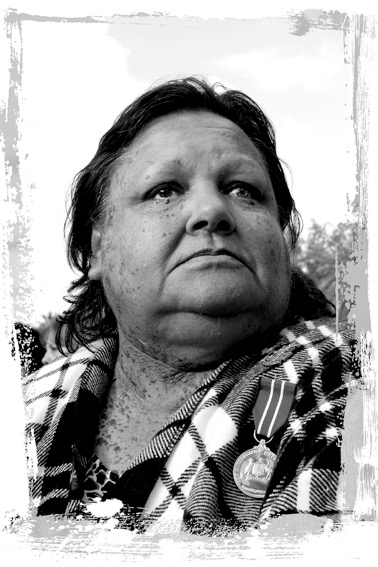Marj Tripp AO (deceased)
Ramindjeri Elder
Retired Wran
Women’s Royal Australian Naval Service
Medals and Awards
Officer of the Order of Australia 2014
Australian Defence Medal
2001 Centenary Medal Ambassador for the Aged
Australia Day Medal 1983 and1993
2010 South Australian NAIDOC Female Elder of the year
2010 Premiers Award
2015 Gladys Elphick Award
“I was born at the McBride Maternity Hospital in Medindie, an inner northern suburb of Adelaide on 16 January 1946, but raised by my mother’s sister, Bubbles Sumner and her partner, Ephraim Tripp in Victor Harbor. In 1963, when I was just 17 years old I signed up to be in the Women’s Royal Australian Naval Service, making me its first Aboriginal member. This all happened four years before I was even considered a citizen in my own country land and it took another fifty years before Aboriginal and Torres Strait Islander servicemen received the recognition we deserved. I was based at Western Port Bay, Victoria, as a support crew member for HMAS Cerberus; and at Nowra, New South Wales for HMAS Albatross. I left the Navy in 1965–at a time when women were not allowed to serve onboard ships. It took another 20 years before things changed. I left the Navy, but I did not leave the Defence community. I served this community as longtime chairwoman of the Aboriginal Ex-Service Members and Dependants Project, which was an RSL-funded initiative set up to connect Aboriginal ex-servicemen and servicewomen and their families with the Department of Veterans Affairs and support systems. I have remained committed to ensuring recognition continues to occur and as Chair of the Aboriginal and Torres Strait Islander War Memorial Committee, we undertook seven years of tireless lobbying and fundraising before a permanent memorial to honour the tens of thousands of Aboriginal and Torres Strait Islander Australians who served our country was finally unveiled in 2013. It sits on the land of the Kaurna people in the Torres Parade Ground precinct of Adelaide in South Australia. The Navy helped shape me into becoming an advocate for Aboriginal rights and equality. I have advocated, across state and national levels, to ensure our Elders receive appropriate aged care and are involved in the planning and policy processes that can improve aged care, health, housing, social welfare outcomes among the Aboriginal and Torres Strait Islander communities. During the 1980s, I proudly chaired the SA branch of the National Aborigines and Islanders Day Observance Committee (NAIDOC) and was involved in setting up the Tandanya National Cultural Institute in Adelaide. In 1999, I was the Ambassador for the International Year of the Older Persons, and in 2001, I received the Centenary Medal, the South Australian Premier’s NAIDOC award for my service to the Aboriginal community. I felt honoured to receive an Order of Australia in 2014 in recognistion of my lifelong commitment to my community. As a mother of five children, 17 grandchildren and 5 great-grandchildren, I was particularly proud and emotional when, in 2015, I was nominated by my grandson, Nathan Kropinyeri, to receive the Gladys Elphick Award and perpetual trophy which recognises the contribution of an Aboriginal woman to her country and community, as Gladys Elphick was one of my Elders and mentors.”
Her grandson, Nathan Kropinyeri, says that Marjorie ‘moved back to her home town of Victor Harbor in 2001 taking with her a handful of her grannies, sharing her upbringing and stories with them.’
Marjorie passed away on 16 May 2016 aged 70 years. The then Aboriginal Affairs Minister, Kyam Maher, said on her passing: “Marjorie Tripp AO demonstrated great bravery in her many remarkable achievements, and in her dedicated service to all Australians. She will long be remembered as a highly respected Ramindjeri Elder, an Aboriginal community leader, a distinguished Australian servicewoman, and a friend to many South Australians.”
